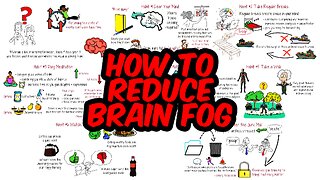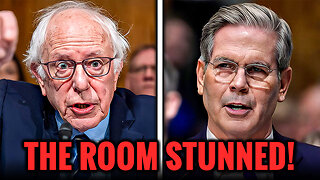Premium Only Content

US Blocks Palestinian Leader Mahmoud Abbas from Attending UN Meeting in New York
Top stories
BBC
US blocks Palestinian leader Mahmoud Abbas from attending UN meeting in New York
1 day ago
AP News
US revokes visas of Palestinian president and other officials ahead of UN General Assembly
1 day ago
2:48
YouTube
· Al Jazeera English
Visas denied for Palestinian officials: US revokes visas ahead of un general assembly
VIDEO 1 day ago
The New York Times
Trump Administration Bars Palestinian Officials From U.N. Meeting in New York
2 days ago
2 days ago — Secretary of State Marco Rubio has revoked the visas of Palestinian President Mahmoud Abbas and 80 other officials ahead of next month's ...
2 days ago — ... repudiate its drive for statehood because this drive for statehood “impairs American national security.” If you can figure that one out, I ...
Google AI Overview
As of late August 2025, the U.S. government is demanding that the Palestinian Authority (PA) and the Palestine Liberation Organization (PLO) repudiate violence and incitement in order to be considered "partners for peace". This follows a broader, long-standing U.S. policy that has been used to deny recognition of a Palestinian state.
U.S. visa denials and sanctions
On August 29, 2025, the U.S. State Department announced it was denying visas to Palestinian President Mahmoud Abbas and about 80 other Palestinian officials ahead of the annual UN General Assembly.
The State Department stated that the PA and PLO must "consistently repudiate terrorism—including the October 7 massacre—and end incitement to terrorism in education" before being considered partners for peace.
This action came as several U.S. allies—including Britain, France, Australia, and Canada—were preparing to formally recognize a Palestinian state during the UN gathering.
In addition to the visa denials, the U.S. government also imposed new sanctions on the PA and PLO in August 2025.
Context of Palestinian statehood
The U.S. government has historically opposed a "unilateral recognition" of a Palestinian state and insists it must be achieved through direct negotiations between Israelis and Palestinians. The current U.S. action is consistent with this stance and is aimed at pressuring Palestinian leadership to conform to its demands.
In response, Palestinian officials have rejected these U.S. and Israeli allegations and argue that U.S.-mediated talks have failed to end the Israeli occupation. The Palestinian leadership and others view the visa denials as a violation of the 1947 UN "headquarters agreement".
The State Department has reported to Congress that the Palestine Liberation Organization (PLO) and Palestinian Authority (PA) are not in compliance with their commitments under the PLO Commitments Compliance Act of 1989 (PLOCCA) and the Middle East Peace Commitments Act of 2002 (MEPCA), including by initiating and supporting actions at international organizations that undermine and contradict prior commitments in support of Security Council Resolution 242 and 338, taking actions to internationalize its conflict with Israel such as through the International Criminal Court (ICC) and International Court of Justice (ICJ), continuing to support terrorism including incitement and glorification of violence (especially in textbooks), and providing payments and benefits in support of terrorism to Palestinian terrorists and their families. The United States is imposing sanctions that deny visas to PLO members and PA officials in accordance with section 604(a)(1) of the MEPCA. It is in our national security interests to impose consequences and hold the PLO and PA accountable for not complying with their commitments and undermining the prospects for peace. state.gov
Other Arab nations, putting on an outward show of continued pan-Arabism, in ... Arab League Council in Aley, Lebanon, in October 1947 and in Cairo ...
Google AI Overview
The Arab League Council convened in Aley, Lebanon, in October 1947 to formulate a response to the United Nations Special Committee on Palestine (UNSCOP) recommendations for partitioning Palestine. The Arab states denounced the partition plan and pledged material and moral support for the Palestinian Arabs.
Key decisions and developments from the meeting:
Rejection of the partition plan: The Arab League unanimously rejected UNSCOP's recommendation to partition Palestine into separate Arab and Jewish states. This was consistent with their long-standing opposition to the creation of a Jewish state.
Military preparations: The League resolved that its member states would take military measures along the borders of Palestine to counter the partition plan. It appointed a Technical Military Committee to supervise the defense needs of Palestinians and prepare for the potential British withdrawal.
No interim Palestinian Arab government: Contrary to some Palestinian Arab leaders' wishes, the Arab states at the conference rejected the formation of an interim Palestinian Arab government. The Arab League Secretariat, led by Abdul Rahman Azzam Pasha, wanted to manage the Palestinian Arab struggle.
Denouncing a Palestinian government-in-exile: Lebanese Prime Minister Riad Al Solh told Hajj Amin al-Husseini, the former Mufti of Jerusalem, that if he formed a Palestinian government, Lebanon would not recognize it. This decision was in line with the League's preference to retain control of the situation.
Heightened rhetoric: According to reports, Azzam Pasha was quoted during this time with strongly worded rhetoric about the potential for war and its devastating consequences. This quote, which has been cited both in and out of context, was used to rally against the creation of a Jewish state.
Arab League Council in Aley, Lebanon, in October 1947 and in Cairo in. December 1947, the Mufti pleaded passionately for the establishment of a shadow ...
Google AI Overview
In late 1947, Arab League meetings in Cairo centered on the United Nations Partition Plan for Palestine, which the Arab League and its member states unanimously rejected. The League's Council was the main body for executing the League's Pact and was based in Cairo. Though the Council was divided over strategies to prevent partition, it ultimately rejected the UN plan, instead calling for the establishment of an Arab state in Palestine.
The League also established a techno-military committee in Cairo in December 1947 to coordinate aid to the Palestinians and decided to form the Arab Liberation Army.
The Arab League's Stance on Palestine in late 1947
Rejection of Partition:
The Arab League and its members strongly opposed the UN Partition Plan for Palestine, which aimed to divide the territory into separate Arab and Jewish states.
Rejection of a Palestinian Arab Government:
The League's Council, meeting in Cairo, rejected the idea of establishing an interim Palestinian Arab government, despite the Arab Higher Committee's chairman, Amin al-Husseini, proposing it.
Focus on Military Action:
Following the rejection of the UN plan, the Arab League decided to form the Arab Liberation Army to go into action in Palestine.
Coordination of Aid:
A techno-military committee was established in Cairo to coordinate military and financial aid to the Palestinians.
The Role of the Council and Cairo
Executive Body: The Arab League Council was responsible for executing the Pact of the League, which was signed in 1945.
Headquarters: The League's headquarters and regular sessions were held in Cairo.
Preparations for Conflict: The Council's discussions in Cairo were instrumental in developing the Arab states' collective response to the impending conflict over Palestine.
The Arab League was formed in Cairo on 22 March 1945 with six members: Egypt, Iraq, Transjordan (renamed Jordan after independence in 1946), Lebanon, Saudi ...
Google AI Overview
In Arab nations, "Aley" most prominently refers to the Aley District in Lebanon, a historically significant area known for its large Druze and Christian populations. The district is one of the most religiously diverse in Lebanon.
The Aley District in Lebanon
Demographics: While the city of Aley is predominantly Druze, the wider district has a large Christian population, primarily Maronite and Greek Orthodox.
Lebanese Civil War: The Aley District was a major battleground during the 1975–1990 Lebanese Civil War.
Government representation: The district is allotted five parliamentary seats in the Lebanese government: three for Christians and two for Druze, reflecting its diverse makeup.
Historical context from the 20th century
The reference to "Aley" and "Arab nations" can also point to a specific historical event.
A 1997 New York Times article republished a report from October 1947 mentioning that delegates of seven Arab nations had met in Aley, Lebanon, for a session of the Arab League.
Other contexts for "Arab nations" and Christians
Christians are a significant minority in several Arab nations and often reside in specific cities. The mention of "Aley" alongside "Arab nations" may implicitly refer to the broader historical and demographic landscape of Middle Eastern Christianity.
Syria: Before the civil war, Christians comprised about 10% of Syria's population. They primarily reside in cities such as Damascus, Aleppo, Homs, and Latakia.
However, the community has seen significant emigration due to the conflict.
Iraq: Christians have been present in Iraq since the first century AD. The community, once numbering over one million before 2003, is now estimated at 250,000 at most, with many concentrated in the Kurdistan Region around Erbil and Dohuk.
Egypt: The Coptic Orthodox Church in Egypt is the largest Christian community in the Middle East, though its population percentage has been a topic of debate in recent decades. The community has faced discrimination and violence.
ALEY, Lebanon — Chief delegates of all seven Arab nations at the meeting of the Council of the Arab League were reported today [Oct. 9] to have agreed on a ...
Google AI Overview
Yes, the United States was not first to recognize Israel at the United Nations, but the United States was the first country to recognize the new State of Israel on May 14, 1948, shortly after its proclamation of independence, though the UN had previously recommended the partition of Palestine. While many nations had supported the UN partition plan, the U.S. recognition was a unilateral act by President Truman.
Details of the Recognition
UN Partition Plan:
On November 29, 1947, the UN General Assembly passed a resolution recommending a plan to partition Mandatory Palestine into separate Arab and Jewish states.
Proclamation of Independence:
The Provisional Government of Israel declared the establishment of the State of Israel on May 14, 1948.
U.S. Recognition:
On the same day, President Harry S. Truman issued a statement recognizing the new Jewish state.
Significance of U.S. Recognition:
This recognition was a momentous decision by President Truman and marked a pivotal moment in U.S.-Israel relations.
Key Points
The U.S. recognition was made by President Truman and was issued as a press release, with the U.S. delegates to the UN not being informed beforehand.
The United States' early recognition of Israel was a significant event, but it was not made at the United Nations itself, rather it was a unilateral action by the U.S. president.
Google AI Overview
On May 14, 1948, David Ben-Gurion, the head of the Jewish Agency, proclaimed the establishment of the State of Israel. U.S. President Harry S. Truman ...
On May 14, 1948, the Arab Higher Committee (AHC) was the body that officially represented the Arabs of Palestine at the United Nations, although it boycotted the initial UN Special Committee on Palestine (UNSCOP) and the subsequent Palestine Commission. While the AHC was recognized by the UN as the representative of the Arabs of Palestine, they proclaimed the establishment of the State of Palestine which was rejected by U.S. President Harry S. Truman ...
Yes, the United States was not the first to block recognition of Palestine at the United Nations; the U.S. vetoed a resolution for full UN membership for Palestine in 1948 all the way through April 2024, but recognition is a separate and broader issue, with the U.S. being one of the few countries not recognizing a Palestinian state, which many other nations have already done.
Full UN Membership vs. Recognition
Full Membership:
A country must be admitted as a member state by a recommendation from the UN Security Council (which the U.S. can veto) and then a two-thirds vote in the UN General Assembly. The U.S. used its veto power in April 2024 to block this recommendation for the State of Palestine.
Diplomatic Recognition:
This is a separate act by individual UN member states to acknowledge Palestine as a state. A large majority of UN member states have already recognized a Palestinian state, with notable exceptions including the United States and other G7 countries like Germany, Italy, and Japan.
Historical Context
The concept of blocking recognition has been present for a long time. The U.S. has previously cut funding to UN bodies like UNESCO if Palestine was admitted as a member.
The April 2024 veto was not the first time the U.S. blocked a bid for full membership, and the U.S. government consistently maintains that Palestinian statehood must come through direct negotiations between the parties, not through unilateral actions in New York.
Join the Weekly Video Call
Call 305-333-1925
-
 6:32
6:32
Blackstone Griddles
12 hours agoCajun Smashburgers with Bruce Mitchell | Blackstone Griddles
4482 -
 43:16
43:16
The Finance Hub
15 hours ago $0.06 earnedBREAKING: DONALD TRUMP JUST SHOCKED THE WORLD!
66 -
 LIVE
LIVE
BEK TV
22 hours agoTrent Loos in the Morning - 9/03/2025
399 watching -
 LIVE
LIVE
The Bubba Army
21 hours agoNick Hogan Sues Bubba to BLOCK the DOC - Bubba the Love Sponge® Show | 9/03/25
5,403 watching -
 8:01
8:01
MattMorseTV
12 hours ago $10.19 earnedHe's ACTUALLY doing it...
70.5K60 -
 33:25
33:25
Uncommon Sense In Current Times
15 hours ago $1.80 earnedHollywood’s Woke Agenda Exposed | Kevin Sorbo on Cancel Culture, Faith & the Common Sense Revolution
18K -
 8:23
8:23
The Art of Improvement
19 hours ago $0.46 earned7 Smart Habits to Boost Mental Clarity
2.37K2 -
 12:09
12:09
China Uncensored
11 hours agoI Have NEVER Been More Furious
3.98K17 -
 2:12
2:12
WildCreatures
4 days ago $0.83 earnedThe beauty and mystery of the Pantanal, Brazil's best secret
4.17K2 -
 9:38
9:38
Millionaire Mentor
18 hours agoBernie Sanders LOSES IT After Scott Bessent’s Shocking Comeback
3.55K8